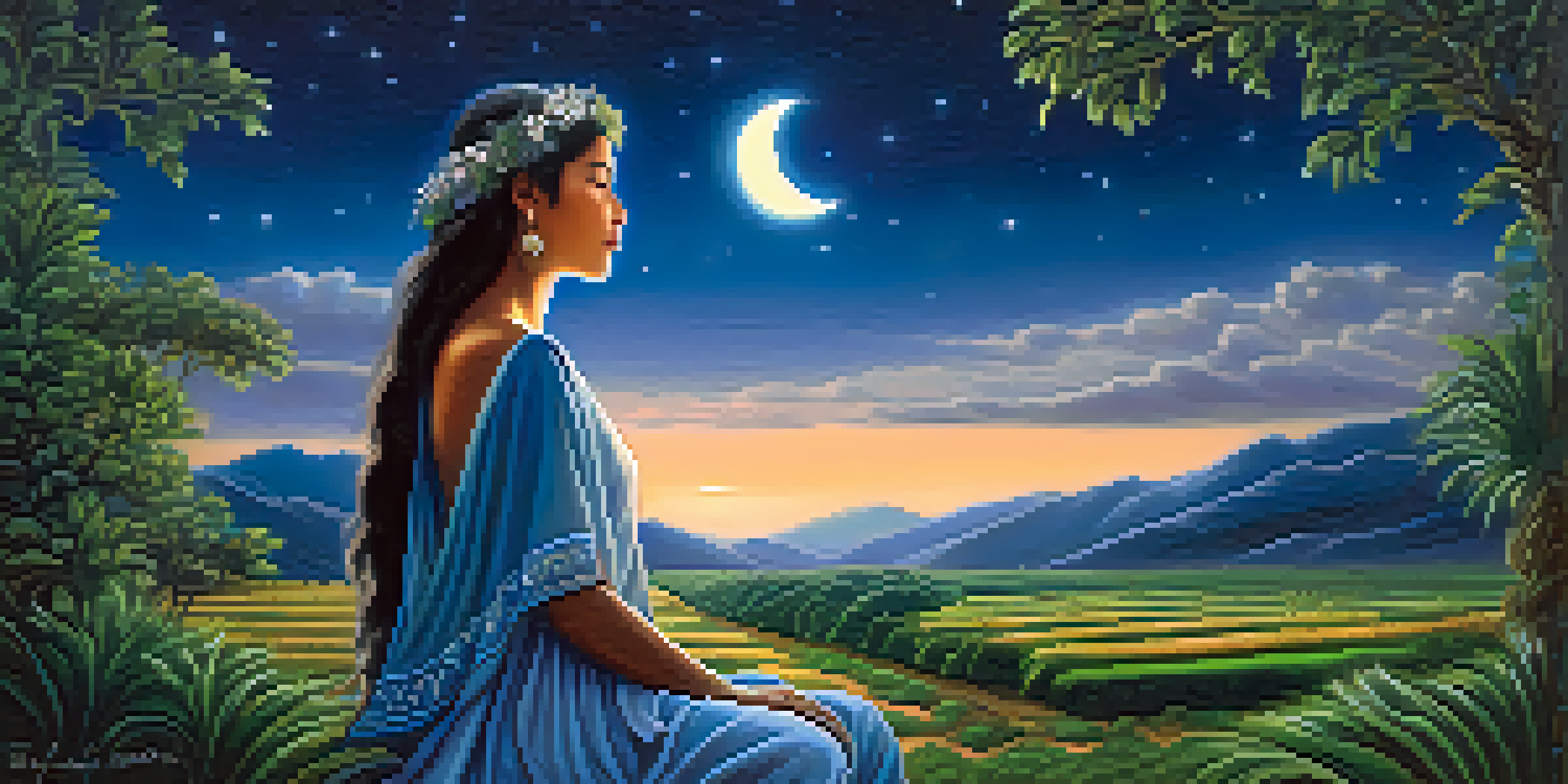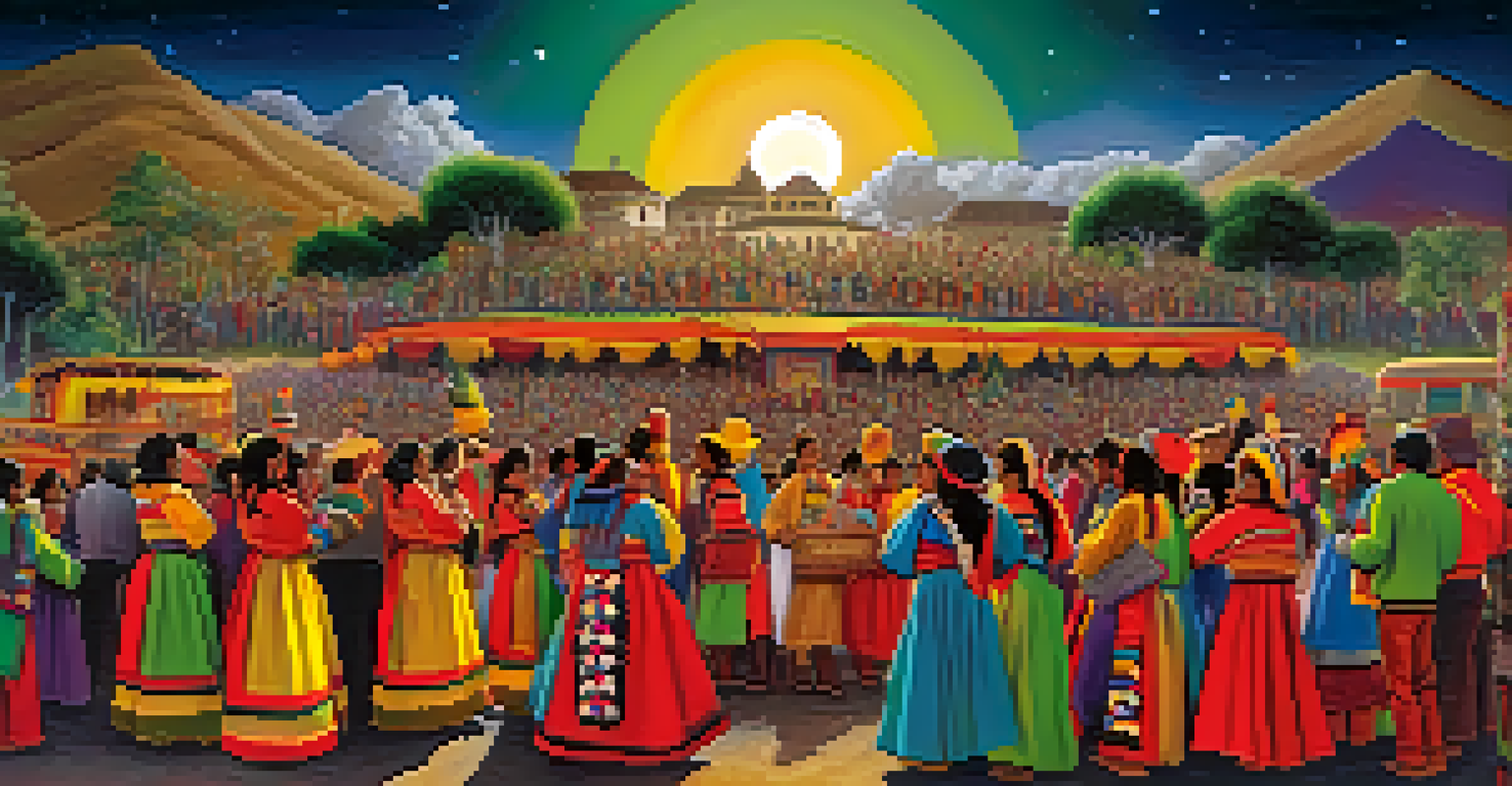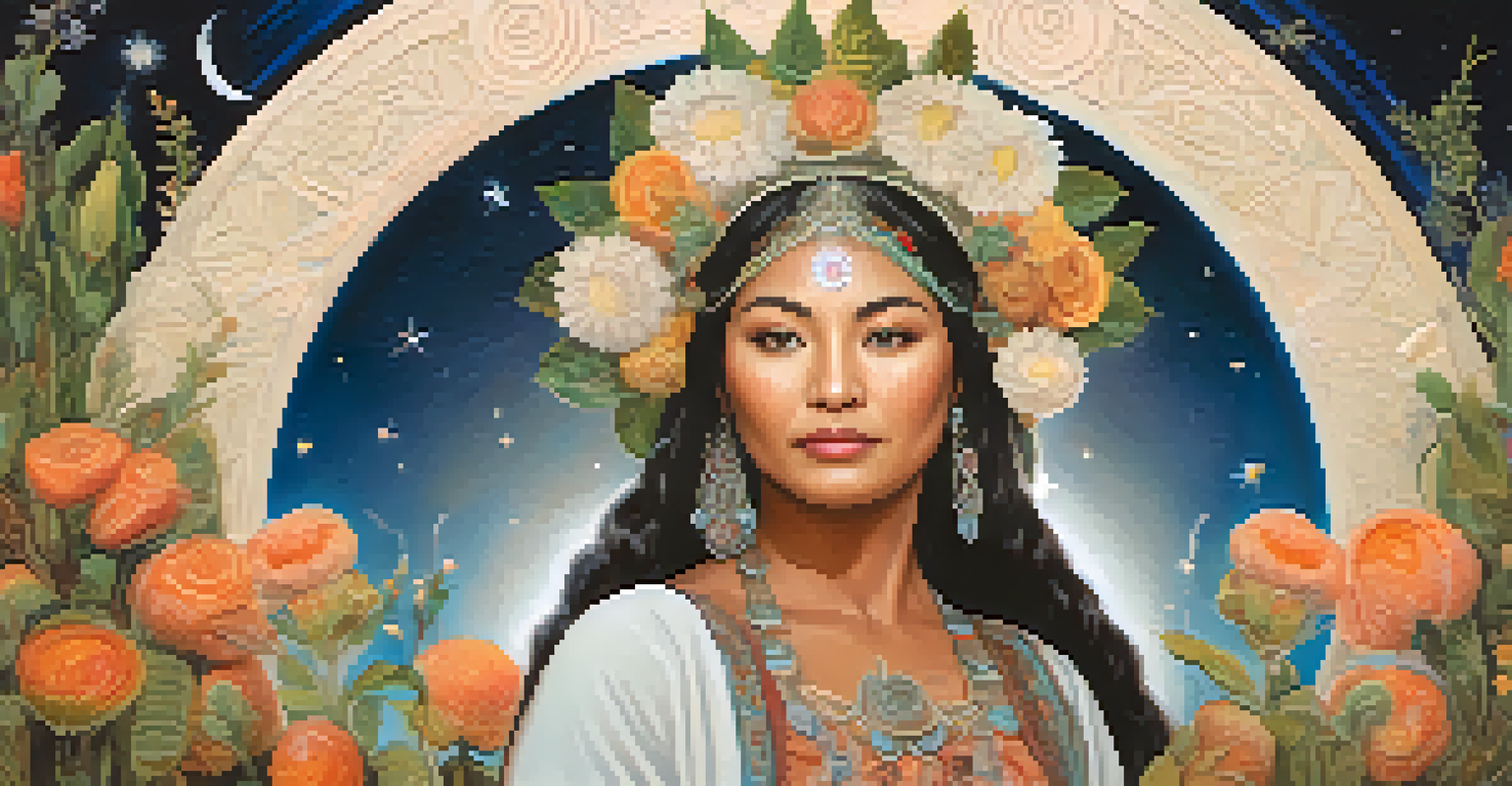Mama Quilla: The Moon Goddess of Inca Mythology

Introduction to Mama Quilla: The Moon Goddess
Mama Quilla is a revered figure in Inca mythology, embodying the moon and its cycles. As the goddess of the moon, she played a crucial role not only in the spiritual realm but also in the daily lives of the Inca people. Her influence was felt in agriculture, navigation, and even in the timing of rituals, making her a pivotal deity in the Inca pantheon.
The moon is a reminder that no matter what phase we are in, we are still whole.
Often depicted with a luminous face, Mama Quilla represents the beauty and serenity of the night sky. Her presence was believed to control the tides and affect the fertility of crops, linking her directly to the sustenance of life. This connection illustrates how the Incas viewed celestial bodies as essential components of their agricultural society.
In addition to her agricultural importance, Mama Quilla was also seen as a protector of women. She was often invoked during childbirth and other significant life events, symbolizing nurturing and care. Through her, the Incas expressed their reverence for femininity and the cycles of life, much like the moon's phases.
Mythological Stories Surrounding Mama Quilla
Numerous myths highlight Mama Quilla's significance, one of which tells of her love for her brother, Inti, the sun god. Their relationship symbolizes the balance of night and day, showcasing how both deities contribute to the harmony of existence. This duality is a recurring theme in many cultures, reflecting the interconnectedness of opposing forces.

Another popular story involves Mama Quilla's transformation into the moon after a tragic series of events. In this narrative, she sacrifices her earthly existence to become a celestial being, representing the idea of transcending suffering and embracing a higher purpose. This tale resonates with the idea of personal sacrifice for the greater good.
Mama Quilla: Goddess of the Moon
Mama Quilla embodies the moon and its cycles, influencing agriculture, navigation, and women's roles in Inca society.
These stories not only highlight Mama Quilla's divine nature but also serve as moral lessons for the Inca people. They emphasize values such as love, sacrifice, and the importance of balance in life—lessons that are still relevant today. Through storytelling, the Incas preserved their cultural beliefs and passed them down through generations.
Mama Quilla's Influence on Inca Agriculture
Agriculture was the backbone of Inca society, and Mama Quilla played an essential role in this aspect of their culture. The Incas believed that her light was vital for the growth of crops, particularly those that were harvested at night. Festivals honoring her were often timed with the lunar calendar to ensure successful planting and harvesting.
Nature does not hurry, yet everything is accomplished.
Farmers would look to the moon phases as indicators of when to sow and reap their crops. This deep connection between Mama Quilla and agricultural practices illustrates the Incas' understanding of natural cycles. By aligning their agricultural activities with lunar phases, they maximized their yields and ensured food security.
Furthermore, Mama Quilla was often celebrated with rituals that sought her blessings for a bountiful harvest. These ceremonies not only honored the goddess but also reinforced community bonds as people gathered to pray and celebrate together. In this way, Mama Quilla was more than a deity; she was a symbol of unity and cooperation among the Inca people.
Rituals and Celebrations in Honor of Mama Quilla
The Incas held various rituals to honor Mama Quilla, particularly during the full moon. These ceremonies often included offerings of food, flowers, and even llamas, which were considered sacred animals. Such offerings were meant to express gratitude and seek the goddess's favor for health and prosperity.
During these celebrations, communities would gather to share stories, music, and dance, creating a festive atmosphere. The rituals served not only as a way to pay homage to Mama Quilla but also as a means of reinforcing cultural identity and solidarity among the people. Through these collective activities, they kept their traditions alive and infused their daily lives with spirituality.
Mythology and Moral Lessons
The myths surrounding Mama Quilla emphasize themes of love, sacrifice, and balance, reflecting the values of the Inca people.
In addition to full moon celebrations, the Incas also marked specific agricultural festivals linked to Mama Quilla's cycles. These events were essential for maintaining the agricultural calendar and were deeply rooted in the spiritual beliefs of the community. Through such rituals, the Incas demonstrated their respect for the natural world and their reliance on divine forces for sustenance.
Mama Quilla's Symbolism in Inca Culture
Inca culture is rich with symbolism, and Mama Quilla embodies various elements that reflect the values of society. As the moon goddess, she symbolizes femininity, intuition, and nurturing, representing the essential qualities that sustain life. This association with femininity also highlights the important role of women in Inca society.
Her connection to the moon also signifies the passage of time and the cycles of life, emphasizing that change is a natural part of existence. Just as the moon waxes and wanes, so do the seasons and the human experience. This cyclical view of life was fundamental to the Inca understanding of agriculture, spirituality, and community.
Moreover, Mama Quilla’s image is often found in Inca art and textiles, further cementing her place in their culture. These depictions served not only as decorative elements but also as reminders of the values she represents. By embedding her symbolism into their daily lives, the Incas maintained a constant connection to her divine presence.
Mama Quilla in Modern Perception
Today, Mama Quilla continues to capture the imagination of people interested in Inca mythology and indigenous cultures. Her stories and symbolism resonate with those who seek a deeper understanding of nature and its cycles. This renewed interest often leads to discussions about the importance of respecting and preserving indigenous beliefs.
In contemporary spirituality, Mama Quilla is often invoked for guidance and reflection during phases of the moon. Many view her as a source of feminine energy and wisdom, drawing parallels between her lunar attributes and modern concepts of empowerment. This connection to the moon encourages individuals to embrace their intuition and embrace change.
Cultural Legacy and Modern Relevance
Today, Mama Quilla's influence can be seen in contemporary spirituality and cultural festivals that honor her enduring legacy.
Furthermore, cultural festivals celebrating Mama Quilla are sometimes revived, providing opportunities for education and cultural exchange. These events not only honor the goddess but also foster a greater appreciation for the rich history of the Inca civilization. Through these celebrations, Mama Quilla remains a vital link to the past, reminding us of the enduring power of mythology.
Conclusion: The Legacy of Mama Quilla
Mama Quilla's legacy is one of beauty, wisdom, and interconnectedness, serving as a guiding force for the Inca people. Her stories illustrate the importance of balance in life, reflecting the harmony between nature and humanity. As a revered figure, she continues to inspire and teach lessons about love, sacrifice, and the cycles of existence.
The impact of Mama Quilla transcends time, reminding us of the value of cultural mythology in understanding our world. Her significance in agriculture, rituals, and community life demonstrates how mythology can shape societal values and practices. Even today, her influence can be seen in modern spiritual beliefs and cultural revivals.

In celebrating Mama Quilla, we not only honor an ancient goddess but also recognize the timeless lessons she imparts. Her story encourages us to reflect on our connection to nature, the importance of community, and the cycles of life that we all navigate. Ultimately, Mama Quilla remains a powerful symbol of resilience and nurturing in the human experience.